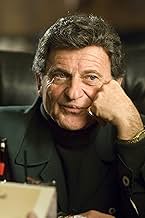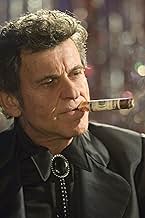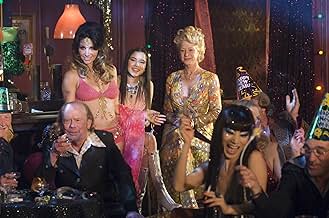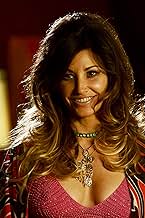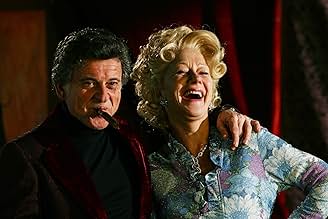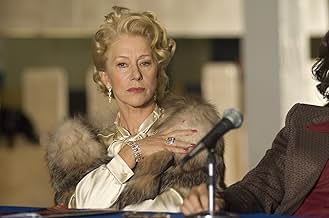NOTE IMDb
5,6/10
3,5 k
MA NOTE
Un film dramatique racontant l'histoire d'un couple marié qui a ouvert le premier bordel légal au Nevada.Un film dramatique racontant l'histoire d'un couple marié qui a ouvert le premier bordel légal au Nevada.Un film dramatique racontant l'histoire d'un couple marié qui a ouvert le premier bordel légal au Nevada.
- Réalisation
- Scénario
- Casting principal
- Récompenses
- 1 victoire et 1 nomination au total
Raoul Max Trujillo
- Hernan Prado
- (as Raoul Trujillo)
Avis à la une
10palmmgt
Over the years, I haven't agreed with a lot of the reviews on this site, and this is the case with this movie. I just never bothered to sign up to contribute until now, after just watching this movie.
The film starts out drab, with unsympathetic characters on dead end story arches, which is exactly how it fools the viewer. By the middle of the movie, you realize your notions about them and their journeys were wrong, and in the end, you know there's a reason the movie is loaded with high caliber talent.
And considering it's based on real events, it's all the more interesting and compelling.
The film starts out drab, with unsympathetic characters on dead end story arches, which is exactly how it fools the viewer. By the middle of the movie, you realize your notions about them and their journeys were wrong, and in the end, you know there's a reason the movie is loaded with high caliber talent.
And considering it's based on real events, it's all the more interesting and compelling.
Love Ranch fooled me but good. For some reason, I was picturing a raucous, raunchy comedy about a legal brothel run by Joe Pesci and Helen Mirren. But it's not really that way at all; no, this is a standard-issue melodrama about an abusive misogynist who runs his part of the world, his steely wife who runs the business side of the things, and the hapless pro boxer who gets mixed up with them. It's not funny because it's not supposed to be, and that's kind of sad; there's potential for laughs, but in the end all you get are clichés and bad character choices.
Charlie (Pesci) and Grace (Mirren) Bontempo open up the first legal brothel in Nevada. She's the daughter of a prostitute, he's done a stretch in San Quentin. It's the 1970s. They have a pretty good setup for themselves; good-looking women, steady clients, and the law on their side (and in their pockets). They don't want for much, seemingly. Then Charlie, a hotheaded tempest in a teacup if ever there was one, gets the idea that they'll garner more respect (or, more accurately, he will) if they own a successful professional boxer. So he buys the contract of one Armando Bruza, an up-and-coming Argentinian, much to Grace's chagrin. Charlie's banking on his guy doing well in his next fight, based on the rumor that Muhammed Ali would take on the winner.
Here, Pesci plays a slightly watered-down version of Tommy DeVito from Goodfellas. He's foul mouthed, ill tempered, not very bright about a great many things, and seems to survive on chutzpah and the good grace of, well, Grace. Naturally, being the proprietor of a brothel has its privileges, and Charlie samples the wares with some regularity, an occurrence that Grace idly tolerates. When she's asked to become Bruza's manager - as a felon, Charlie can't get a license - she's reluctant, but the swarthy boxer has other ideas. And so it goes.
Now, there's nothing inherently wrong with predictability. If I expect A to happen, and A happens, that's okay - as long as A wasn't spelled out as a fait accompli. If I expect A to happen, but B happens, that is also okay - as long as B is plausible. Here, I expect A to happen, and A happens, and it's obvious from almost the start of the movie that A will happen. This extends to character development as well. If a character does something, say, out of character (!), that's fine - as long as it propels the plot AND makes some bit of sense. Otherwise, it's just a ploy to get me to keep watching. In this movie, Charlie's character is so one-dimensional that when he makes an attempt to be lovey-dovey with Grace it's not even remotely believable. I can blame Pesci a little for this, but it just seem as if he had much to work with.
And for a movie that uses a brothel as its main background, there's very little naughty stuff going on; they may as well have set it in a video store, if those still existed. There's a side plot about some high-and-mighty moral compass waging a war against the legal brothel, but it's barely touched upon, pardon the pun. (The other puns are unpardonable.) The plot just bounces around from issue to issue, circling the main story threat of Bruza, Grace, and Charlie. The result is sometimes maudlin and hackneyed and other terms writers use to describe crappy writing.
Charlie (Pesci) and Grace (Mirren) Bontempo open up the first legal brothel in Nevada. She's the daughter of a prostitute, he's done a stretch in San Quentin. It's the 1970s. They have a pretty good setup for themselves; good-looking women, steady clients, and the law on their side (and in their pockets). They don't want for much, seemingly. Then Charlie, a hotheaded tempest in a teacup if ever there was one, gets the idea that they'll garner more respect (or, more accurately, he will) if they own a successful professional boxer. So he buys the contract of one Armando Bruza, an up-and-coming Argentinian, much to Grace's chagrin. Charlie's banking on his guy doing well in his next fight, based on the rumor that Muhammed Ali would take on the winner.
Here, Pesci plays a slightly watered-down version of Tommy DeVito from Goodfellas. He's foul mouthed, ill tempered, not very bright about a great many things, and seems to survive on chutzpah and the good grace of, well, Grace. Naturally, being the proprietor of a brothel has its privileges, and Charlie samples the wares with some regularity, an occurrence that Grace idly tolerates. When she's asked to become Bruza's manager - as a felon, Charlie can't get a license - she's reluctant, but the swarthy boxer has other ideas. And so it goes.
Now, there's nothing inherently wrong with predictability. If I expect A to happen, and A happens, that's okay - as long as A wasn't spelled out as a fait accompli. If I expect A to happen, but B happens, that is also okay - as long as B is plausible. Here, I expect A to happen, and A happens, and it's obvious from almost the start of the movie that A will happen. This extends to character development as well. If a character does something, say, out of character (!), that's fine - as long as it propels the plot AND makes some bit of sense. Otherwise, it's just a ploy to get me to keep watching. In this movie, Charlie's character is so one-dimensional that when he makes an attempt to be lovey-dovey with Grace it's not even remotely believable. I can blame Pesci a little for this, but it just seem as if he had much to work with.
And for a movie that uses a brothel as its main background, there's very little naughty stuff going on; they may as well have set it in a video store, if those still existed. There's a side plot about some high-and-mighty moral compass waging a war against the legal brothel, but it's barely touched upon, pardon the pun. (The other puns are unpardonable.) The plot just bounces around from issue to issue, circling the main story threat of Bruza, Grace, and Charlie. The result is sometimes maudlin and hackneyed and other terms writers use to describe crappy writing.
The thing that stands out immediately in "Love Ranch" is not the girls, not the 1970s clothes, but the amazing photography. Almost every outdoor scene could be the vista for a postcard. The story itself seems to drag in places, and then suddenly rush to a conclusion, with narration to tidy up the ending. The acting by Helen Mirren and Joe Pesci is terrific as expected, and a small scene with Harve Presnell a pleasant surprise. What is not a surprise is the tale of the Mustang Ranch on which the movie is based. It's tough to overcome the familiarity of a story often aired on cable over the last two decades. - MERK
The film has two sags: One very early on in Act I and another late in Act II. In observing a small private audience that was viewing this film, they were all very much engaged in the drama and the action throughout, but they were nearly lost during the two sags. If it were not for those, the film might have attracted a larger audience.
This is not the story of the Mustang Ranch, per se, but rather the story an ambiguous love triangle. (I am thoroughly aware of the Mustang Ranch story, and know Joe Conforte's attorney and best friend, Virgil Bucchanieri, quite well). For example, the film does not use the gimmick of trying to exaggerate the characters that inhabit the brothel, and resists the temptation of trying to replicate the exotica of the Star Wars bar scene.
The real test for a film with this class of story arc is the degree to which we care about the characters mid-way through Act II. Do we care what happens to them in Act III? I and the other audience members all agreed that we did and we shed the expected tears in a tense moment between the dreamer, played by Joe Pesci, and the determined pragmatist, played by Helen Mirren, in the penultimate scene. None of the central or supporting roles were in any way "cardboard" characters.
The production values were quite high and the number of technical errors were minimal (three errors with production sound that really should have been fixed in post plus a couple of continuity errors). Music was very subtle to the point of vanishing at times. There was no attempt at creating a photographic theme: it was all shot color-balanced at neutral without any exaggerated focus-pulls, odd camera framing or moves (but a lot of crane rentals were involved), Pro-mist filters, or too many magic hour shots. That is, the cinematography did not draw attention away from the drama.
The film resolves unambiguously with a shock ending that is well worth waiting for. My final test of entertainment value is: "Are there any scenes in this film that I will remember and repeat in my mind's eye the next day?" I would say that there are such scenes, and I therefore give this picture a 7 out of 10.
This is not the story of the Mustang Ranch, per se, but rather the story an ambiguous love triangle. (I am thoroughly aware of the Mustang Ranch story, and know Joe Conforte's attorney and best friend, Virgil Bucchanieri, quite well). For example, the film does not use the gimmick of trying to exaggerate the characters that inhabit the brothel, and resists the temptation of trying to replicate the exotica of the Star Wars bar scene.
The real test for a film with this class of story arc is the degree to which we care about the characters mid-way through Act II. Do we care what happens to them in Act III? I and the other audience members all agreed that we did and we shed the expected tears in a tense moment between the dreamer, played by Joe Pesci, and the determined pragmatist, played by Helen Mirren, in the penultimate scene. None of the central or supporting roles were in any way "cardboard" characters.
The production values were quite high and the number of technical errors were minimal (three errors with production sound that really should have been fixed in post plus a couple of continuity errors). Music was very subtle to the point of vanishing at times. There was no attempt at creating a photographic theme: it was all shot color-balanced at neutral without any exaggerated focus-pulls, odd camera framing or moves (but a lot of crane rentals were involved), Pro-mist filters, or too many magic hour shots. That is, the cinematography did not draw attention away from the drama.
The film resolves unambiguously with a shock ending that is well worth waiting for. My final test of entertainment value is: "Are there any scenes in this film that I will remember and repeat in my mind's eye the next day?" I would say that there are such scenes, and I therefore give this picture a 7 out of 10.
Something went wrong with this Taylor Hackford film which showed on cable recently. It boasts a good cast and it is a story based on a true story. The right elements should have come together to make this entry worth watching. The culprit seems to lie in the screenplay written by Mark Jacobson, which does not take advantage of the subject he was treating.
The story of Grace and Charley Bontempo, the owners of the brothel in the Nevada desert, lent itself for a lot more than comes out in the story. The owners had apparently a good relationship, although it becomes apparent there was no love left between them as the story begins. Charley had been cheating on Grace with anyone of the prostitutes in the place. Grace, the brain behind the business, finds out about the cancer she had to deal with, something that evidently has an effect on her dealings with their business.
Charley, a first class wheeler-dealer, sees an opportunity when Armando Bruza, an Argentine boxer, he discovers with a potential to go places. Grace did not appreciate that Bruza will move to the Love Motel, as Charley wants. Bruza develops an affection for the older woman, who takes the plunge, falling in love with the boxer, something that will lead into fatal consequences.
The main reason for watching "Love Ranch" is Helen Mirren's performance. She makes a case for Grace, the jaded madam of the house of ill repute. At times she seems not to be comfortable with her character, the way the script asks her to play her. Joe Pesci does his routine of being a wise guy. It is fun to watch him utter those four letter words he spices his vocabulary with. Sergio Peris-Mencheta is Bruza, the boxer who fell for the older woman. Gina Gershon does not have much to do.
The story of Grace and Charley Bontempo, the owners of the brothel in the Nevada desert, lent itself for a lot more than comes out in the story. The owners had apparently a good relationship, although it becomes apparent there was no love left between them as the story begins. Charley had been cheating on Grace with anyone of the prostitutes in the place. Grace, the brain behind the business, finds out about the cancer she had to deal with, something that evidently has an effect on her dealings with their business.
Charley, a first class wheeler-dealer, sees an opportunity when Armando Bruza, an Argentine boxer, he discovers with a potential to go places. Grace did not appreciate that Bruza will move to the Love Motel, as Charley wants. Bruza develops an affection for the older woman, who takes the plunge, falling in love with the boxer, something that will lead into fatal consequences.
The main reason for watching "Love Ranch" is Helen Mirren's performance. She makes a case for Grace, the jaded madam of the house of ill repute. At times she seems not to be comfortable with her character, the way the script asks her to play her. Joe Pesci does his routine of being a wise guy. It is fun to watch him utter those four letter words he spices his vocabulary with. Sergio Peris-Mencheta is Bruza, the boxer who fell for the older woman. Gina Gershon does not have much to do.
Le saviez-vous
- AnecdotesBased at least roughly on 1976 events involving the Mustang Ranch in Sparks, Nevada, and Argentine former heavyweight Oscar "Ringo" Bonavena.
- GaffesAt the beginning of the film, Charlie and the band are performing to a packed house. The drummer uses a crash cymbal from the very popular Zildjian company, the A Custom. This movie takes place in 1976, and the Zildjian A Custom didn't come out until 1990.
- Citations
[first lines]
Grace Bontempo: Selling love will make you rich. That's what my mother taught me. Just don't put your heart in it.
- Bandes originalesI Just Want to Make Love to You
Written by Willie Dixon
Performed by Foghat
Courtesy of Bearsville Records/Rhino Entertainment Company
By arrangement with Warner Music Group Film & TV Licensing and by arrangement with Victor Entertainment, Inc. for Japan
Meilleurs choix
Connectez-vous pour évaluer et suivre la liste de favoris afin de recevoir des recommandations personnalisées
- How long is Love Ranch?Alimenté par Alexa
- Is "Love Ranch" based on a book?
- When was prostitution made legal in Nevada?
- In what year does the movie take place?
Détails
- Date de sortie
- Pays d’origine
- Site officiel
- Langue
- Aussi connu sous le nom de
- Ljubezenski ranc
- Lieux de tournage
- Sociétés de production
- Voir plus de crédits d'entreprise sur IMDbPro
Box-office
- Budget
- 25 000 000 $US (estimé)
- Montant brut aux États-Unis et au Canada
- 137 885 $US
- Week-end de sortie aux États-Unis et au Canada
- 44 220 $US
- 4 juil. 2010
- Montant brut mondial
- 146 149 $US
- Durée1 heure 57 minutes
- Couleur
- Mixage
- Rapport de forme
- 1.85 : 1
Contribuer à cette page
Suggérer une modification ou ajouter du contenu manquant

Lacune principale
By what name was Love Ranch (2010) officially released in India in English?
Répondre

